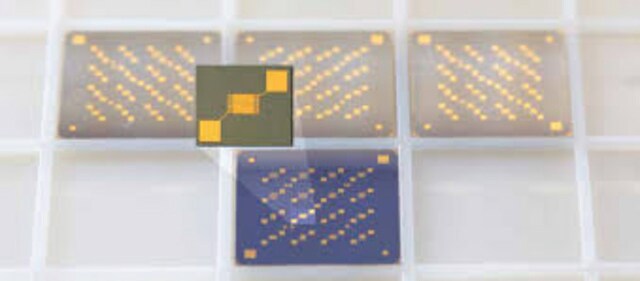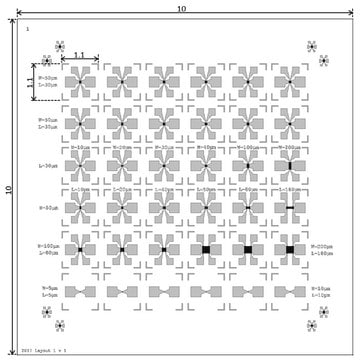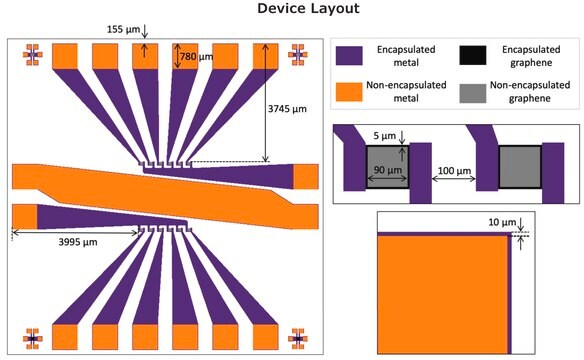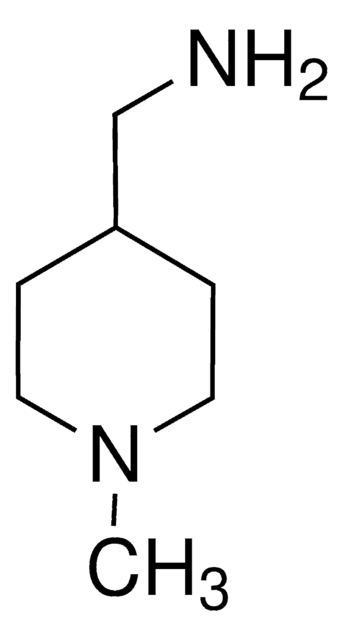FIPMS176
Back-gated OFET Substrate
n-doped silicon wafer with 230 nm SiO2 gate-insulator, chips (diced)
Se connecterpour consulter vos tarifs contractuels et ceux de votre entreprise/organisme
About This Item
Code UNSPSC :
43211915
Nomenclature NACRES :
NA.23
Produits recommandés
Forme
chips (diameter 200 mm)
chips (diced)
Conditionnement
pack of 1 (wafer of 112 diced chips)
Description générale
Substrate: 200 mm wafer according to semiconductor standard (used for bottom-gate)
Layer structure:
Layer structure:
- Gate: n-doped silicon (doping at wafer surface: n~3x1017/ cm3)
- Gate oxide: 230 nm ± 10 nm SiO2 (thermal oxidation)
- Drain/source:none
- Protection: resist AR PC 5000/3.1 (soluble in AZ-Thinner or acetone)
- Layout: bare oxide but diced
- Chip size: 15 x 15 mm2
- No. of chips: 112 per wafer
Application
Back-gated OFET Substrate (organic field-effect transistor) can be used in the fabrication of chemical sensors for potential usage in pH sensing and detection of immunoassays. It can also be used in the fabrication of biosensors by coating the sheets of the FET with a specific antibody for the detection of SARS-CoV-2. FET based biosensors can be potentially used in clinical diagnosis, point of care testing, and on-site detection.
For material scientists in the field of organic semiconductors, it is critically important to have standardized device architecture for material analysis.
These back-gated organic filed-effect transistor (OFET) substrates were fabricated inside the cleanroom, and source and drain electrodes can be deposited either prior or after the deposition of an organic semiconductor material, giving versatility for the choice of source/drain materials and satisfy different preferred device architectures.
When an organic semiconductor layer is deposited on such a substrate, the bulk Si acts as gate electrode and controls the channel current between the post-deposited source and drain electrodes on the top. A suitably doped Si-SiO2 interface in CMOS quality guarantees a reproducible gate contact.
These back-gated organic filed-effect transistor (OFET) substrates were fabricated inside the cleanroom, and source and drain electrodes can be deposited either prior or after the deposition of an organic semiconductor material, giving versatility for the choice of source/drain materials and satisfy different preferred device architectures.
When an organic semiconductor layer is deposited on such a substrate, the bulk Si acts as gate electrode and controls the channel current between the post-deposited source and drain electrodes on the top. A suitably doped Si-SiO2 interface in CMOS quality guarantees a reproducible gate contact.
Conditionnement
diced wafer on foil with air tight packaging
Notes préparatoires
Recommendation for resist removal:
To guarantee a complete cleaning of the wafer / chip surface from resist residuals, please rinse by acetone and then dry the material immediately by nitrogen (compressed air).
Recommendation for material characterization:
If gate currents appear during the characterization of the field effect transistors, considerable variations could occur at the extraction of the carrier mobility. Therefore it is necessary to check the leakage currents over the reverse side (over the chip edges) of the OFET-substrates.
To guarantee a complete cleaning of the wafer / chip surface from resist residuals, please rinse by acetone and then dry the material immediately by nitrogen (compressed air).
Recommendation for material characterization:
If gate currents appear during the characterization of the field effect transistors, considerable variations could occur at the extraction of the carrier mobility. Therefore it is necessary to check the leakage currents over the reverse side (over the chip edges) of the OFET-substrates.
Stockage et stabilité
Store the wafers at a cool and dark place and protect them against sun.Resist layer was applied to prevent damage from scratches. Expiration date is the recommended period for resist removal only. After resist removal, the substrate remains functional and does not expire.
Informations légales
Product of Fraunhofer IPMS
Faites votre choix parmi les versions les plus récentes :
Certificats d'analyse (COA)
Lot/Batch Number
Désolés, nous n'avons pas de COA pour ce produit disponible en ligne pour le moment.
Si vous avez besoin d'assistance, veuillez contacter Service Clients
Déjà en possession de ce produit ?
Retrouvez la documentation relative aux produits que vous avez récemment achetés dans la Bibliothèque de documents.
Random CNT network and regioregular poly (3-hexylthiophen) FETs for pH sensing applications: A comparison
Munzer AM, et al.
Biochim. Biophys. Acta Gen. Subj., 1830(9), 4353-4358 (2013)
The impact of biosensing in a pandemic outbreak: COVID-19
Morales-Narvaez E and Dincer C
Biosensors And Bioelectronics, 14(4), 112274-112274 (2020)
Rapid detection of COVID-19 causative virus (SARS-CoV-2) in human nasopharyngeal swab specimens using field-effect transistor-based biosensor
Seo G, et al.
ACS Nano, 14(4), 5135-5142 (2020)
Polymer composite-based OFET sensor with improved sensitivity towards nitro based explosive vapors
Dudhe RS, et al.
Sensors and Actuators B, Chemical, 148(1), 158-165 (2010)
Notre équipe de scientifiques dispose d'une expérience dans tous les secteurs de la recherche, notamment en sciences de la vie, science des matériaux, synthèse chimique, chromatographie, analyse et dans de nombreux autres domaines..
Contacter notre Service technique





